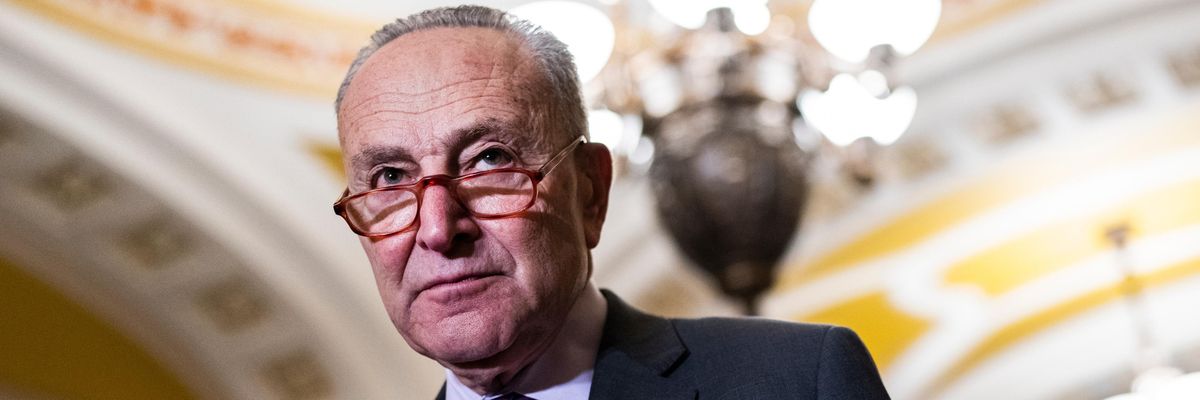In May, Senate Majority Leader Chuck Schumer promised an early-summer vote on bipartisan antitrust legislation that, while relatively modest, would take concrete steps to curb the vast power of Big Tech.
But with the end of the year approaching, Schumer has yet to deliver on his pledge, angering supporters of the bills who say the Democratic leader is caving to Apple, Google, Amazon, and Meta--corporate behemoths that have been lobbying aggressively against the antitrust measures.
According to a report released Friday by the consumer advocacy group Public Citizen, opponents of the American Innovation and Choice Online Act (AICOA) "spent nearly $277 million on lobbying on all issues, giving them a six-to-one advantage over supporters, which have spent about $45 million."
Furthermore, the report found that "lobbyists opposing AICOA contributed $2.3 million to members of Congress during the 2022 cycle, three times more than supporters."
AICOA, sponsored by Sen. Amy Klobuchar (D-Minn.), is one of three antitrust bills that have been languishing in the Senate for months despite attracting support from Republicans and Democrats.
If passed, AICOA would prevent tech platforms such as Amazon from unfairly elevating their own products, an anti-competitive practice known as self-preferencing.
The Open App Markets Act (OAMA), a bill led by Sen. Richard Blumenthal (D-Conn.), aims to rein in Apple and Google's dominance of the mobile app ecosystem, a duopolistic position the companies have used to crush competition and give their own products special treatment.
Antimonopoly campaigners have long feared that Schumer's ties to Big Tech--one of his daughters is a registered lobbyist for Amazon while the other works for Meta--and torrents of campaign cash could imperil the bills' prospects in the Senate.
Donald Shaw and David Moore of the investigative outlet Sludgereported Thursday that the Democratic Senatorial Campaign Committee (DSCC), Senate Democrats' campaign arm, "has received bundles of campaign checks from Google lobbyist Michael D. Smith, Amazon lobbyist Brian Griffin, the PAC of Amazon lobbying firm Akin Gump, co-founder of Apple lobbying firm Invariant Heather Podesta, and co-founder of Amazon lobbying Subject Matter James A. Ryan."
"Some of the bundled donations were delivered in the third quarter of this year as the bills' sponsors called on Schumer to bring them up for a vote, including donations from Google lobbyist Smith, a member of the DSCC's 'Majority Trust Legacy Circle,' a special category of V.I.P. donors," Shaw and Moore added.
HuffPostnoted Friday that "Big Tech executives specifically targeted [Schumer] over the spring and summer in their successful efforts to delay a floor vote on the bills."
"He fielded phone calls from the CEOs of Google and Amazon in June," the outlet continued. "And in August, Bloomberg reported that Schumer had received $30,000 in donations from top lobbyists for Apple, Amazon, and Alphabet after receiving no comparable sums in the two preceding election cycles."
Time is running out for the Senate to move the antitrust bills during the lame-duck congressional session.
One possible vehicle for the measures, and likely lawmakers' last chance to pass them this session, is the sprawling omnibus spending package that Congress must approve by the end of next week to prevent a government shutdown.
Bloomberg's Emily Birnbaum reported Friday that "there's a very serious eleventh-hour push to get OAMA, the app store bill, in the omnibus."
"Both Senate Judiciary leaders have signed off on it," Birnbaum wrote on Twitter. "But it still needs Schumer and [Senate Minority Leader Mitch] McConnell's support."
Sarah Miller, executive director of the American Economic Liberties Project, said in a statement Friday that "Senator Schumer's legacy as majority leader will be defined by whether he succeeds in putting the well-being of working people, honest businesses, and American democracy over the corrupting influence of Big Tech and other corporate monopolies."
"Dozens of bipartisan hearings over the last two years have detailed the broad range of harms Big Tech and monopoly power cause: the systematic abuse of working people and small businesses, the collapse of independent local journalism, the manipulation and surveillance of children, the unfair barriers to innovation and upward mobility, and the erosion of democracies around the world," said Miller. "With support from the White House and extensive bipartisan cooperation to advance important bills that would reassert Congress' authority over monopolies like Google and Amazon, Senator Schumer's legacy as majority leader is on the line."
Fight for the Future, a digital rights group, tweeted Saturday that "these bills should pass."
"They have overwhelming bipartisan support," the group added. "If they don't pass, it will be because Joe Biden sat on his hands and Sen. Schumer did a favor for his Big Tech donors/buddies/lobbyist family members."

